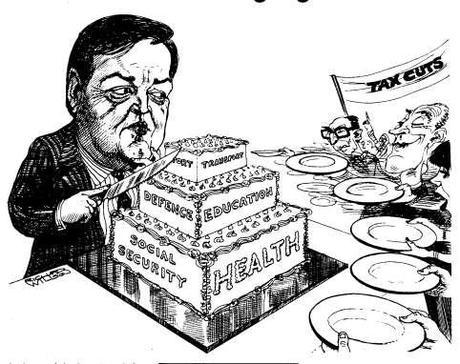It is almost politically impossible to explicitly increase a tax rate, or to impose any new tax on individuals. But politicians struggle to square this with public demands for enhanced public services or, more recently, opposition to austerity measures. Consequently, ‘stealth taxes’- tax levies or other revenue raising measures designed to evade public notice- have become a widespread phenomenon, but Britain specialises in them. The Thatcher government more than doubled VAT, masking a tax hike in people’s shopping bills, whilst presenting itself as a ‘low tax’ administration. Later, Gordon Brown used various stealth taxes to finance much needed public investment. Today, left-wing opponents label the Coalition’s bedroom tax and tuition fees increase as stealth taxes (they were designed to cut spending, but both have actually cost the government money).
Meanwhile, right-wing critics accuse the Coalition of stealthily raising the tax contribution of the ‘middle class’ by raising the thresholds at which the 40p Income Tax band, Inheritance Tax and Stamp Duty are paid, at sub-inflation rates. That the former two affect about the richest 15% and 5% of the population respectively does not stop talk of ‘hitting the squeezed middle’. Nevertheless, as the thresholds fall in cash terms, more and more people pay the respective taxes, and they pay more of them. This ‘tax creep’ can raise billions of pounds, and can do so quite progressively, in stark contrast to the the rest of the Coalition’s regressive austerity agenda. In certain cases, tax creep could be a Good Thing.
The problem is, it offends the upper middle class, the Tories’ electoral bedrock. That’s why they have revived talk of cuts to the 40p Income Tax band and Inheritance Tax after the next general election. Cynics would suggest that the Conservatives said the same thing before the last election, but failed to honor such expensive policies. However, I think the Tories intend to follow through this time, aware that it costs less, politically and financially, to give tax breaks to the modestly affluent than the ‘filthy rich’, who have already benefited hugely from Tory government.

Given there will be a budget deficit of £70 billion in 2015 that will need filling, at least partly, through tax increases, there could be a fairer and more transparent means of doing so. For example, a 30p Income Tax band could be introduced at the current 40p band threshold (around £42,000) and frozen in cash terms. Over a period of several years, the 40p threshold would rise with inflation, over time creating a significant 30p band between the thresholds. This would have the benefit of increasing tax revenues whilst softening the impact on high(ish) earners. It would also mitigate the rather sharp rise from 20p to 40p Income Tax that can come as a shock to those promoted into the upper band.
Solutions are yet more complicated with regards to Inheritance Tax and Stamp Duty, particularly given their connection to the issue of housing. With British house prices rapidly soaring into the stratosphere (for example, London prices rose by 18.5% last year) policymakers are beginning to consider inheritances to be the difference between property ownership and rental ‘slavery’- being tied to an overpriced and insecure rentals market. As such, the 40% paid on inheritances above £325,000 has become deeply unpopular- though only with people with any hope of buying a house. The ‘have nots’ who expect modest inheritances generally don’t care.
Then there is Stamp Duty, peculiar in that it is not banded like other taxes. For example, someone buying a house for £249,999 pays 1% of the entire sum, £2,499.99 in Stamp Duty, but 3%, £7,500, on a £250,000 house. Before the post-2000 house price boom, the majority of homeowners would never have paid a penny in Stamp Duty, but most houses have ascended in value whilst Stamp Duty (SD) thresholds remain static. The Daily Telegraph complains that Stamp Duty dampens the housing market- as if a) house prices were not already increasing at an unhealthy rate and b) a few thousand pounds in tax is really noticed when the value of a given house rises by that much in the space of a month. However, it is fair to say SD is applied unfairly: it was designed to apply only to the most expensive houses, not all of them. Also, its ‘slab’ banding distorts house prices.
A new tax regime is needed to raise the several billion made by Stamp Duty, but in a more equitable fashion, ideally in a way which does not exacerbate the present housing crisis. The stealth tax of static SD bands should give way to a transparent tax system. I would like to float the idea that SD is abolished on homes worth less than £1 million. Instead, a reasonable rate of Capital Gains Tax (CGT) should be levied even on taxpayers’ main homes. This move, which would be politically untenable if not accompanied by a sweetener like the removal of SD, would mark a symbolic transition from taxing people’s need to house themselves to taxing unearned wealth. It would also shift the tax burden from cash-strapped first-time buyers to those in larger properties. And crucially, CGT would actively discourage housing speculation, a problem which is damaging our economy by restricting the mobility and spending power of workers.
There might be fairer and more honest ways of raising money for public services than ‘tax creep’. However, the aim of them must be an equitable and people-friendly distribution of social costs, not the placation of the Daily Telegraph.

